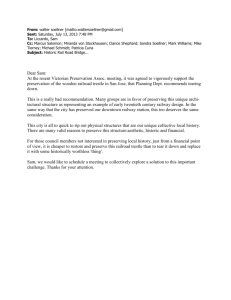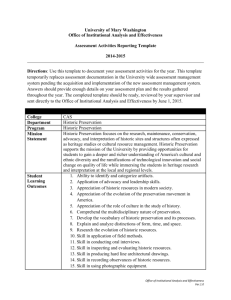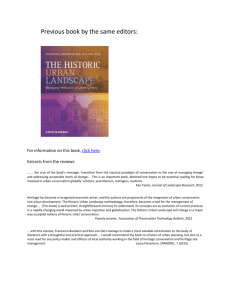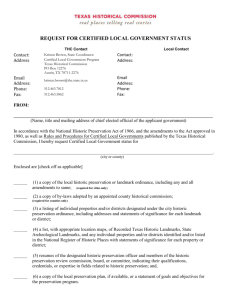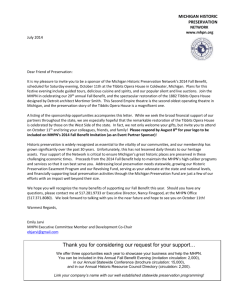syllabus - Applied History
advertisement
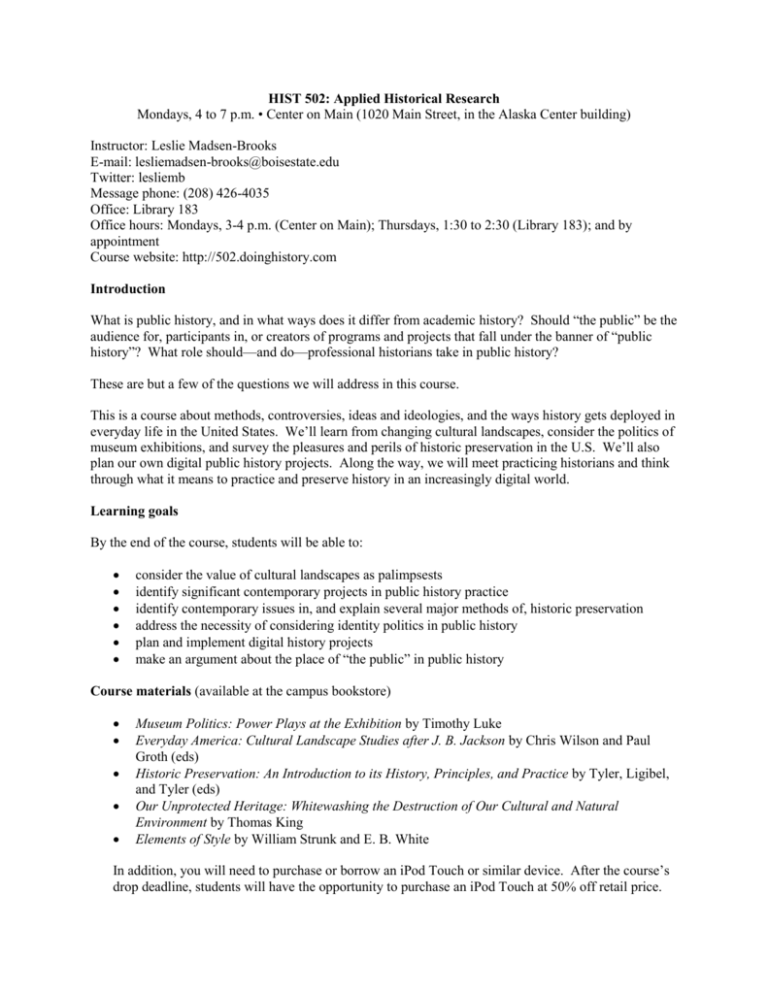
HIST 502: Applied Historical Research Mondays, 4 to 7 p.m. • Center on Main (1020 Main Street, in the Alaska Center building) Instructor: Leslie Madsen-Brooks E-mail: lesliemadsen-brooks@boisestate.edu Twitter: lesliemb Message phone: (208) 426-4035 Office: Library 183 Office hours: Mondays, 3-4 p.m. (Center on Main); Thursdays, 1:30 to 2:30 (Library 183); and by appointment Course website: http://502.doinghistory.com Introduction What is public history, and in what ways does it differ from academic history? Should “the public” be the audience for, participants in, or creators of programs and projects that fall under the banner of “public history”? What role should—and do—professional historians take in public history? These are but a few of the questions we will address in this course. This is a course about methods, controversies, ideas and ideologies, and the ways history gets deployed in everyday life in the United States. We’ll learn from changing cultural landscapes, consider the politics of museum exhibitions, and survey the pleasures and perils of historic preservation in the U.S. We’ll also plan our own digital public history projects. Along the way, we will meet practicing historians and think through what it means to practice and preserve history in an increasingly digital world. Learning goals By the end of the course, students will be able to: consider the value of cultural landscapes as palimpsests identify significant contemporary projects in public history practice identify contemporary issues in, and explain several major methods of, historic preservation address the necessity of considering identity politics in public history plan and implement digital history projects make an argument about the place of “the public” in public history Course materials (available at the campus bookstore) Museum Politics: Power Plays at the Exhibition by Timothy Luke Everyday America: Cultural Landscape Studies after J. B. Jackson by Chris Wilson and Paul Groth (eds) Historic Preservation: An Introduction to its History, Principles, and Practice by Tyler, Ligibel, and Tyler (eds) Our Unprotected Heritage: Whitewashing the Destruction of Our Cultural and Natural Environment by Thomas King Elements of Style by William Strunk and E. B. White In addition, you will need to purchase or borrow an iPod Touch or similar device. After the course’s drop deadline, students will have the opportunity to purchase an iPod Touch at 50% off retail price. Participation The day-to-day requirements of this class are simple: do the required reading, reflect on it, and come to class prepared to engage in thoughtful discussion. (I promise to do the same.) Your presence in class is very important. Participation in course discussions constitutes a significant portion of your grade (10%). To receive an A for your participation, you must participate meaningfully in class just about every day. Merely attending class will earn you a C- for participation. A note about digital devices: Typically I ask students to turn off digital devices during class, unless they need to use them as an accommodation for a disability. In this seminar, however, we’ll be exploring digital history, so in many cases you’ll find a laptop, a smartphone, or wireless-enabled mobile device will be useful or even necessary. That said, I prefer that when we meet for our seminar, students use their computers and phones only for course-related activities. Using them for outside activities—e.g. checking e-mail, updating Facebook, or texting—tends to divide our attention. Writing The quality of your writing—both its clarity and the depth of thought expressed in it—contributes significantly to your final grade in this course. It is imperative, then, that you schedule sufficient time to conduct the research required for each paper, write a solid first draft, and conduct several revisions. I recommend you form a writing group with two or three other students to swap papers at least a few days before they are due. Because of the number of students in my courses, I can’t review entire drafts of your papers. That said, I’m happy to look over your proposed thesis statement, an outline for your paper, and a paragraph or two that you’re finding troublesome. Please do come see me for help with your papers and projects, as there won’t be opportunities to rewrite them for better grades. Late paper policy In the historical professions, deadlines matter. Exhibitions must open on time. Grant proposal deadlines aren’t negotiable. Collaborative public history endeavors—like building digital tools and organizing festivals—require everyone to contribute in a timely manner so that work may proceed on schedule. The same holds true for this class. Assignments must be turned in at the beginning of class on the day they are due. Late assignments will be penalized 1/3 of a grade (e.g. a B becomes a B-) after the beginning of class, and I will deduct an additional 1/3 grade for each 24 hours that pass before you turn in the paper. That said, I’m not heartless. If you have an emergency or anticipate not being able to turn in your paper on time, come see me and we’ll see if we can work something out. Please note: Technological failure does not constitute an emergency. Hard drives fail, servers go down, file transfers time out, and files get corrupted. You must plan for such contingencies: keep backups of your files, have extra ink cartridges handy, know where the local wifi hotspots are in case your home internet connection goes down. Technological issues are not excuses for late work. Please protect yourself (and your grades) by managing your time and backing up your work. Grade distribution Class participation: 10% Fabulous public history project introduction (blog post): 10% Public history career introduction (blog post): 10% Reflections on assigned readings (on blog), plus comments on others’ reflections: 10% Wiki contributions for which you are the primary author: 15% Mobile public history project plan: 15% Mobile public history project implementation: 15% Final paper: 15% Plagiarism A student commits plagiarism not only if she turns in someone else’s work as her own, but also if she borrows others’ ideas or phrases without giving them credit. We can discuss this in class if anyone has any questions. Any student who plagiarizes or cheats on any assignment may receive an F on the assignment or in the course and may be subject to academic discipline by the university. I am interested in your thoughts and your creative and analytical work. Please share them with me! Accommodations I need to hear from anyone who has a disability that may require some modification of seating, assignments, or other class requirements so that appropriate arrangements may be made. Please see me after class or during my office hours. Talk to me I will be available during my office hours to address your concerns with the class and assignments. I encourage you to come see me if you feel you have not been offered a chance to participate in class discussion, you are troubled by a particular assignment, you would like to talk more with me about an issue raised in class, or you have concerns about your performance in the course. COURSE SCHEDULE Please complete each set of readings before class on the date shown. January 24: Introduction. Wandering. January 31: Cultural landscapes, part I J. B. Jackson, “To Pity the Plumage and Forget the Dying Bird” (PDF available in Blackboard under “Course Documents”) Everyday America chapters 1, 11, 5, 7 February 7: Cultural landscapes, part II Everyday America chapters 6, 12, 13, 16, 17 February 14: Digital histories, part I: curiosity, play, serendipity, learning “But I Want You to Think!” http://clioweb.org/2009/06/08/but-i-want-you-to-think/ “Welcome to Play the Past” http://www.playthepast.org/?p=252 “7 Ways Mobile Apps are Enriching Historical Tourism” http://mashable.com/2010/09/26/mobile-apps-historical-tours/ “Augmenting Archaeology” http://www.playthepast.org/?p=80 Explore Were You There? website: http://www.wereyouthere.com/browse-topics.php “Haunts: Place, Play, and Trauma” http://www.samplereality.com/2010/06/01/hauntsplace-play-and-trauma/ “Location-Based Gaming for Education: Try Gowalla” http://chronicle.com/blogs/profhacker/location-based-gaming-for/26720 “Too Late to Apologize” http://www.youtube.com/watch?v=uZfRaWAtBVg&feature=related Fabulous public history project introduction due (post on blog by Sunday 2/13 at noon) Feb. 21: President’s Day holiday. Class does not meet. February 28: Digital histories, part II: research methods, sharing Explore The Spatial History Project at http://www.stanford.edu/group/spatialhistory/cgibin/site/index.php – especially Shaping the West at http://www.stanford.edu/group/spatialhistory/cgi-bin/site/project.php?id=997 “The Beginning of the Road” http://www.washingtonpost.com/wpsrv/artsandliving/magazine/features/2008/dc-1791-to-today/story.html Explore the “Findings” column of “Mobile for Museums” at http://chnm.gmu.edu/labs/mobile-for-museums/ Explore the Center for History and New Media website: http://chnm.gmu.edu/ Public history career introduction due (post on blog by Sunday 2/27 at noon) March 7: Museums, Part I Museum Politics introduction, plus chapters 1, 2, 5, 9 March 14: Museums, part II Museum Politics chapters 3, 6, 7, 8, plus conclusion Mobile public history project plan due March 21: Historic Preservation, Part I Historic Preservation chapters 1, 2, 3 (in chapter 3, skim pp. 63-102 and read pp. 103119). “Teaching Preservation: What’s Endangered in Boise?” http://blogs.nationaltrust.org/preservationnation/?p=10476 Final paper proposal due (1 page) March 28: Spring break. Class does not meet. April 4: Historic Preservation, Part II Historic Preservation chapters 4 (skim), 5, 6 (skim), 7 (read through p. 220; skim 221235), 9, 11. April 6-9: National Council on Public History conference April 11: Digital histories, part III: case studies First, explore The Last American Pirate website: http://lastamericanpirate.net/ but— IMPORTANT!—skip the first blog entry; immediately scroll down and begin reading the rest. Only after you have explored the site above (spoiler alert!), read http://edwired.org/2008/12/18/you-were-warned/ Readings recommended by students April 18: Ethical dilemmas, Part I: deploying history for political ends “They Have Blood on Their Hands” http://wearerespectablenegroes.blogspot.com/2010/11/they-have-blood-on-their-handssons-of.html “Virginia 4th-grade textbook criticized over claims on black Confederate soldiers” http://www.washingtonpost.com/wpdyn/content/article/2010/10/19/AR2010101907974.html “Open Letter to the Curators of the Baron Von Munchausen House” http://northwesthistory.blogspot.com/2010/06/open-letter-to-curators-of-te-baronvon.html “You as a Professor should stop bringing into the 21st century all this negativism” http://northwesthistory.blogspot.com/2010/09/baron-von-munchausen-strikes-back.html “Conservative class on Founding Fathers' answers to current woes gains popularity” http://www.washingtonpost.com/wpdyn/content/article/2010/06/04/AR2010060404918.html?sub=AR April 25: Ethical dilemmas, Part II Our Unprotected Heritage May 2: To be determined by student interest. Final paper due. May 9: Final exam, 6-8 p.m. – mobile project presentations.
